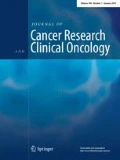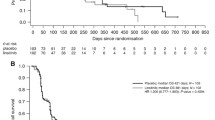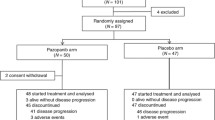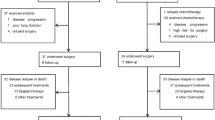Abstract
Purpose
The controlled phase III trial SATURN demonstrated that maintenance therapy with erlotinib after the first-line platinum-based chemotherapy prolonged progression-free survival (PFS) and overall survival (OS) of non-small cell lung cancer (NSCLC) patients with advanced, non-progressive disease. We conducted the non-interventional study SATURN NIS to investigate the effectiveness and tolerability of erlotinib maintenance in daily clinical practice.
Methods
This single-arm NIS screened 290 patients with locally advanced or metastatic NSCLC (stage IIIB or IV) and stable disease after standard platinum-based first-line chemotherapy in 95 institutions across Germany. Erlotinib was dosed and administered corresponding to the terms of the marketing authorization at the time of recruitment. The main effectiveness endpoint was subjects’ OS at 1 year. Subgroup analyses of survival estimates of OS and PFS were performed.
Results
272 patients were eligible for analysis (median age 66 years, 37.1% females, 99.6% Caucasian, median ECOG performance status 1, 61.8% adenocarcinoma, 96.3% of patients with stable disease). Maintenance therapy with erlotinib resulted in median OS comparable to that of the SATURN phase III trial 10.4 months [95% CI: (8.8; 12.5) vs. 11.9 months]. The 1-year survival rate was 45.6% [95% CI: (37.5%; 53.6%)]. No new safety signals were observed. As expected, patients with epidermal growth factor receptor (EGFR) mutations derived a greater benefit concerning OS and PFS than EGFR–wild-type patients. Moreover, a significant association of OS and PFS and the smoking status was observed.
Conclusions
The results of this non-interventional study support the current clinical practice of erlotinib switch maintenance in EGFR-mutation-positive patients.


Similar content being viewed by others
References
Brugger W, Triller N, Blasinska-Morawiec M et al (2011) Prospective molecular marker analyses of EGFR and KRAS from a randomized, placebo-controlled study of erlotinib maintenance therapy in advanced non-small-cell lung cancer. J Clin Oncol 29:4113–4120
Cappuzzo F, Ciuleanu T, Stelmakh L et al (2010) SATURN investigators. Erlotinib as maintenance treatment in advanced non-small-cell lung cancer: a multicentre, randomised, placebo-controlled phase 3 study. Lancet Oncol 11:521–529
Cicènas S, Geater SL, Petrov P et al (2016) Maintenance erlotinib versus erlotinib at disease progression in patients with advanced non-small-cell lung cancer who have not progressed following platinum-based chemotherapy (IUNO study). Lung Cancer 102:30–37
Coudert B, Ciuleanu T, Park K et al (2012) SATURN Investigators. Survival benefit with erlotinib maintenance therapy in patients with advanced non-small-cell lung cancer (NSCLC) according to response to first-line chemotherapy. Ann Oncol 23:388–394
Esteban E, Majem M, Martinez Aguillo M et al (2015) Prevalence of EGFR mutations in newly diagnosed locally advanced or metastatic non-small cell lung cancer Spanish patients and its association with histological subtypes and clinical features: the Spanish REASON study. Cancer Epidemiol 39:291–297
Faehling M, Eckert R, Kuom S et al (2010) Benefit of erlotinib in patients with non-small-cell lung cancer is related to smoking status, gender, skin rash and radiological response but not to histology and treatment line. Oncology 78:249–258
Hughes AN, O’Brien ME, Petty WJ et al (2009) Overcoming CYP1A1/1A2 mediated induction of metabolism by escalating erlotinib dose in current smokers. J Clin Oncol 27:1220–1226
Mok TS, D’Arcangelo M, Califano R (2012) Clinical outcomes with erlotinib in patients with epidermal growth factor receptor mutation. Drugs 72(Suppl 1):3–10
Novello S, Barlesi F, Califano R et al (2016) ESMO guidelines committee. Metastatic non-small-cell lung cancer: ESMO clinical practice guidelines for diagnosis, treatment and follow-up. Ann Oncol 27(suppl 5):v1–v27
Piperdi B, Perez-Soler R (2012) Role of erlotinib in the treatment of non-small cell lung cancer: clinical outcomes in wild-type epidermal growth factor receptor patients. Drugs 72(Suppl 1):11–19
Rosell R, Carcereny E, Gervais R et al (2012) Spanish Lung Cancer Group in collaboration with Groupe Français de Pneumo-Cancérologie and Associazione Italiana Oncologia Toracica. Erlotinib versus standard chemotherapy as first-line treatment for European patients with advanced EGFR mutation-positive non-small-cell lung cancer (EURTAC): a multicentre, open-label, randomised phase 3 trial. Lancet Oncol 13:239–246
Skov BG, Høgdall E, Clementsen P et al (2015) The prevalence of EGFR mutations in non-small cell lung cancer in an unselected Caucasian population. APMIS 123:108–115
Tan PS, Lopes G, Acharyya S et al (2015) Bayesian network meta-comparison of maintenance treatments for stage IIIb/IV non-small-cell lung cancer (NSCLC) patients with good performance status not progressing after first-line induction chemotherapy: results by performance status, EGFR mutation, histology and response to previous induction. Eur J Cancer 51:2330–2344
Tapia C, Savic S, Bihl M et al (2009) EGFR mutation analysis in non-small-cell lung cancer: experience from routine diagnostics. Pathologe 30:384–392
Tarceva® (2016) 25 mg/100 mg/150 mg coated tablets, summary of product characteristics (SmPC 11/2016)
Funding
Roche Pharma AG, Grenzach-Wyhlen, Germany provided financial support for this study and for manuscript services by AMS Advanced Medical Services with regard to drafting of the manuscript and editing.
Author information
Authors and Affiliations
Corresponding author
Ethics declarations
Conflict of interest
MF has performed clinical phase IB-IV trials sponsored by Roche, Boehringer Ingelheim, and AstraZeneca, and received honoraria from Roche, Boehringer Ingelheim, and AstraZeneca in the past. JA reports personal fees from AstraZeneca, Bristol-Myers Squibb (BMS), Boehringer Ingelheim, Novartis, and Roche outside the submitted work. US and HWT have nothing to disclose. PS reports grants, personal fees, and non-financial support from Roche and Celgene, and grants from Astra Zeneca during the conduct of the study. In addition, outside the submitted work, PS reports grants, personal fees, and non-financial support from Pfizer, Novartis, Amgen, grants from MSD and BMS, and grants and personal fees from Astellas. VG reports personal fees from Roche Pharma AG outside the submitted work. WB reports personal fees from Roche, Boehringer Ingelheim, Lilly, AstraZeneca, BMS, Merck, Novartis, and Pfizer outside the submitted work.
Ethical Approval
The observation plan for this non-interventional study was approved by the local Ethics Committee (Landesärztekammer Baden-Württemberg, F-2010-038). The study was performed in accordance with the 1964 Declaration of Helsinki and its later amendments and Good Clinical Practice guidelines.
Research involving human participants and/or animals
This article does not contain any studies with animals performed by any of the authors.
Informed consent
Informed consent was obtained from all individual participants included in the non-interventional study concerning collection and processing of their personal data.
Rights and permissions
About this article
Cite this article
Faehling, M., Achenbach, J., Staib, P. et al. Erlotinib in routine clinical practice for first-line maintenance therapy in patients with advanced non-small cell lung cancer (NSCLC). J Cancer Res Clin Oncol 144, 1375–1383 (2018). https://doi.org/10.1007/s00432-018-2649-x
Received:
Accepted:
Published:
Issue Date:
DOI: https://doi.org/10.1007/s00432-018-2649-x




